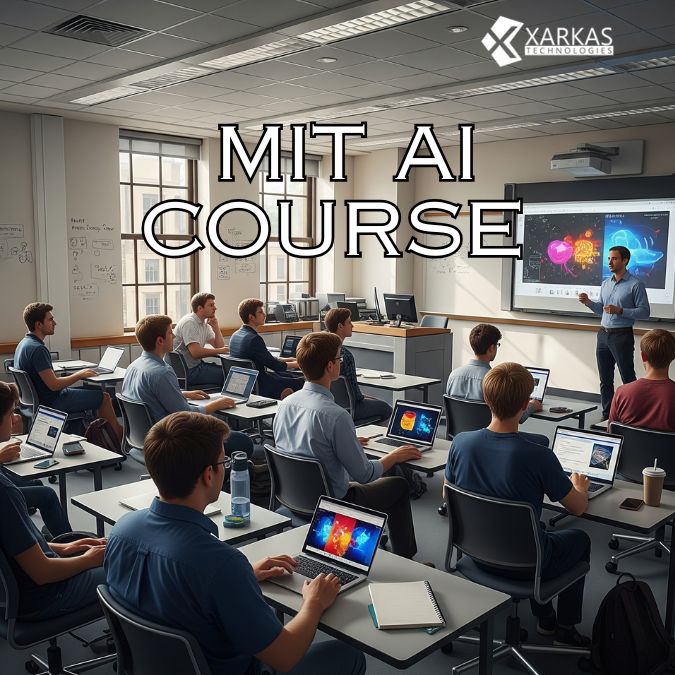
MIT AI Course: A Complete Guide to Learning Artificial Intelligence from MIT
Introduction to MIT AI Courses
Artificial Intelligence (AI) is no longer a buzzword—it’s the backbone of modern innovation. And when it comes to learning AI, MIT (Massachusetts Institute of Technology) stands tall among the world’s most elite institutions.
Table Of Content
- Introduction to MIT AI Courses
- Why MIT is a Global Leader in AI Education
- What Makes MIT’s AI Courses Unique
- Overview of MIT AI Programs
- 1. MIT OpenCourseWare (OCW)
- 2. Professional Education AI Courses
- 3. MIT xPro Artificial Intelligence Program
- 4. MicroMasters Program in Statistics and Data Science
- Key Topics Covered in MIT AI Courses
- 1. Machine Learning Fundamentals
- 3. Neural Networks and Deep Learning
- 4. Natural Language Processing (NLP)
- 5. Robotics and Computer Vision
- 6. Ethics and Responsible AI
- Who Should Take MIT AI Courses?
- 1. Students
- 2. Working Professionals
- 3. Entrepreneurs and Innovators
- ️ Learning Modes and Platforms
- 1. Self-Paced vs Instructor-Led
- 2. Access via edX, MIT xPro, and OCW
- Cost and Financial Aid Options
- 1. Free Courses through OCW
- 2. Paid Professional Certifications
- 3. Scholarship Opportunities
- Benefits of Taking MIT AI Courses
- 1. World-Class Faculty and Resources
- 2. Practical Projects and Real-World Skills
- 3. Recognition and Credibility
- Career Opportunities After Completing MIT AI Courses
- Roles in AI and Machine Learning
- 1. Research and Academia
- 2. Tech Startups and Innovation Hubs
- Success Stories and Alumni Testimonials
- How to Get Started with MIT AI Courses
- Final Thoughts on Learning AI from MIT
- ❓ FAQs About MIT AI Courses
But what’s so special about MIT’s AI courses? Let’s dive in.
Why MIT is a Global Leader in AI Education
MIT is the birthplace of many AI milestones. Its Computer Science and Artificial Intelligence Laboratory (CSAIL) is one of the most advanced research labs on the planet.
MIT isn’t just teaching AI—they’re inventing its future.
What Makes MIT’s AI Courses Unique
-
Taught by world-renowned AI pioneers like Patrick Winston and Regina Barzilay
-
Based on cutting-edge research and real-world applications
-
Mix of theoretical depth and hands-on experience
-
Free and paid options for all types of learners
Overview of MIT AI Programs
Let’s break down the major avenues MIT offers for learning AI:
1. MIT OpenCourseWare (OCW)
This platform is a treasure trove for anyone looking to learn for free.
-
Most famous course: “Introduction to Deep Learning” (6.S191)
-
Includes full lecture videos, assignments, and exams
-
Self-paced and open to all
2. Professional Education AI Courses
These are designed for working professionals.
-
Duration: 6–12 weeks
-
Topics: AI Strategy, Machine Learning, Deep Tech
-
Taught by MIT faculty with practical business applications
-
Comes with a certificate
3. MIT xPro Artificial Intelligence Program
A premium course for mid-level professionals.
-
Highly interactive modules
-
Team-based projects
-
Personalized feedback from mentors
-
Access to MIT alumni network
4. MicroMasters Program in Statistics and Data Science
Not strictly AI, but lays the foundation with:
-
Probability
-
Data analysis
-
Machine learning
Perfect for those wanting an academic route toward AI mastery.
Key Topics Covered in MIT AI Courses
MIT doesn’t hold back. Their curriculum is loaded with high-impact topics like:
1. Machine Learning Fundamentals
-
Supervised and unsupervised learning
-
Regression and classification
-
Overfitting, bias-variance tradeoff
You’ll not only learn the algorithms—you’ll build them.
3. Neural Networks and Deep Learning
-
CNNs, RNNs, and Transformers
-
Frameworks like TensorFlow and PyTorch
-
Real-world tasks like image recognition and speech processing
4. Natural Language Processing (NLP)
-
Tokenization, parsing, and embeddings
-
Sentiment analysis and chatbots
-
Large Language Models like GPT (yes, like me!)
5. Robotics and Computer Vision
-
Perception and mapping
-
Motion planning
-
AI in autonomous systems like drones and cars
6. Ethics and Responsible AI
MIT emphasizes that AI without ethics is dangerous.
-
Bias in algorithms
-
Data privacy
-
Transparency and accountability in AI systems
Who Should Take MIT AI Courses?
These courses aren’t just for tech geeks. They’re made for:
1. Students
Whether you’re in undergrad or grad school, MIT AI courses boost your academic and research credentials.
2. Working Professionals
From software engineers to business managers, AI is a skill in demand across industries.
3. Entrepreneurs and Innovators
AI is the engine behind smart startups. Learn how to embed AI in your products and services.
️ Learning Modes and Platforms
MIT keeps it flexible:
1. Self-Paced vs Instructor-Led
-
Self-paced: Learn on your schedule (ideal for busy people)
-
Instructor-led: More structure, feedback, and mentorship
2. Access via edX, MIT xPro, and OCW
-
edX: MicroMasters and verified certifications
-
MIT xPro: Career-focused programs
-
OCW: 100% free, self-study material
Cost and Financial Aid Options
Learning from MIT doesn’t have to break the bank.
1. Free Courses through OCW
Yes, you can access world-class AI courses at zero cost!
2. Paid Professional Certifications
Courses range from $1,000–$3,500, depending on duration and depth.
3. Scholarship Opportunities
Some programs offer financial assistance or employer sponsorships.
Benefits of Taking MIT AI Courses

Still on the fence? Here’s what you gain:
1. World-Class Faculty and Resources
You’ll learn directly from the minds shaping the future of AI.
2. Practical Projects and Real-World Skills
From building neural nets to deploying AI in business strategy—it’s hands-on learning at its best.
3. Recognition and Credibility
An MIT certificate on your resume opens global career doors.
Career Opportunities After Completing MIT AI Courses
Roles in AI and Machine Learning
-
Machine Learning Engineer
-
AI Research Scientist
-
Data Scientist
-
AI Product Manager
1. Research and Academia
Many learners go on to publish papers or pursue PhDs.
2. Tech Startups and Innovation Hubs
MIT alumni are constantly founding startups and working at companies like Google, OpenAI, and NVIDIA.
Success Stories and Alumni Testimonials
-
“MIT’s AI course helped me land a job at Amazon as an ML engineer.”
-
“I built my AI-powered startup after finishing the MIT xPro course.”
-
“From a non-tech background to an AI consultant—that’s the MIT difference.”
How to Get Started with MIT AI Courses
-
Choose a course that fits your goals and experience
-
Register and commit to a learning schedule
-
Apply your skills in real-world projects
Final Thoughts on Learning AI from MIT
MIT’s AI courses are more than just online classes—they’re a launchpad into the world of tomorrow. Whether you’re a student, professional, or entrepreneur, MIT gives you the tools, knowledge, and credibility to thrive in the AI era.
So what are you waiting for? The future of AI isn’t waiting—and neither should you.
❓ FAQs About MIT AI Courses
Q1. Are MIT AI courses suitable for beginners?
Yes! MIT OCW and some MIT xPro courses are designed for beginners with foundational math and programming knowledge.
Q2. Can I get a certificate from a free MIT AI course?
No, free OCW courses don’t offer certificates. For verified certification, go for paid courses via edX or MIT xPro.
Q3. How long do MIT AI courses take?
Anywhere from 4 weeks to 12 months depending on the course and format.
Q4. Do I need a technical background to take MIT AI courses?
Basic knowledge of math (linear algebra, calculus) and Python helps but isn’t always mandatory.
Q5. Will these courses help me get a job in AI?
Absolutely. Employers recognize MIT’s credibility, and the practical skills taught are highly relevant to current industry needs.







No Comment! Be the first one.